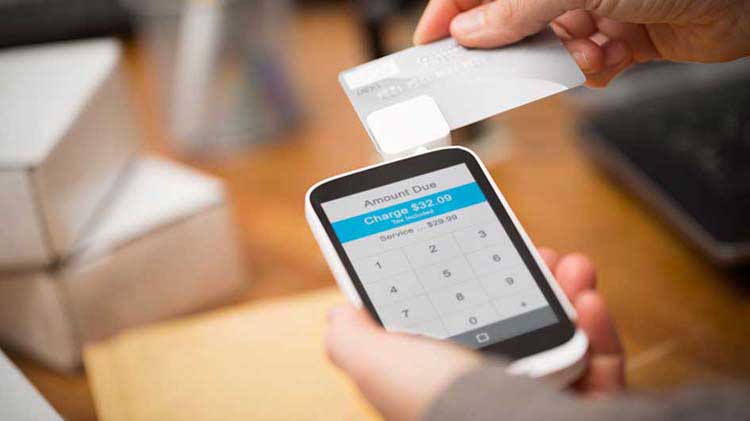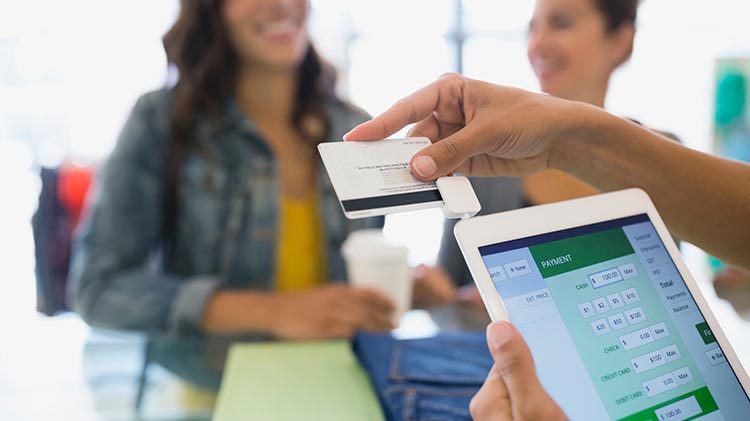Are mobile credit card readers a good choice for small businesses?
How mobile technology works and how it can simplify your small business transactions.
We've been hearing it for years, we're moving toward a cashless society. With 85% of Americans owning a smart phone that statement might not be so hard to believe anymore.
Owners of brick-and-mortar retail stores have no doubt seen a rise in the percentage of customers paying with credit or debit cards. This cashless trend is a result of increased use of mobile devices to make and receive payments. As such, companies have created the mobile card reader: a plug-in device made specifically for use with mobile phones, which increases a user's ability to efficiently and securely take payments.
Instead of the traditional bulky, hard-wired card readers, these small, lightweight mobile readers plug directly into a smartphone or tablet, connect wirelessly, and allow a clerk or salesperson to run a credit or debit card from anywhere inside — or outside — the store.
For the larger-scale business owner, mobile card readers can change the dynamic of a store as well as how clerks interact with customers or conduct sales on the floor.
For the smaller business operator, who may or may not have a brick-and-mortar operation, these readers allow card transactions where previously cash exchanges were the only option.
As fewer people carry large amounts of cash, mobile readers can be a game changer for those who run on-the-go businesses, such as food trucks and on-site repair services, or those who do most of their sales from booths at trade shows, craft fairs and markets.
Should you use a mobile card reader?
- Consider your customers' purchasing attitudes and habits. General acceptance of cashless payments varies by customer and consumer demographic. So, give some thought to how your customers may react and adapt to the introduction of a mobile card reader.
- Are they moving away from carrying cash and would appreciate the card option?
- Would they feel comfortable having their card swiped on a smartphone or tablet?
- Ask yourself: Will adding a mobile payment option open new revenue streams? A tablet or smartphone card reader could allow you to make more sales in ways and in places you hadn't thought possible before.
- Weigh the fees against projected profits. Will your business make enough card-purchase sales using the mobile reader to offset the cost of associated mobile-reader fees?
Mobile card reader price and fees
- Research your options when choosing a processing provider. In addition to banks, there are currently dozens of companies that specialize in processing mobile card purchases. Be sure to:
- Shop around, compare prices and plans; make sure you're dealing with a reputable company.
- Ask other business owners about their experiences with the companies they may be using; ask what their opinions are of specific mobile card readers.
- Decide if you want a pay-per-use (pay-as-you-go) or a contract plan. Two things to consider are:
- If your business will be processing less than $2,000 a month in card-payment sales, you may want to consider pay-per-use.
- If you process less than $2,000 most months but have peak periods when you exceed that, you'll want to average out the year and see if a contract plan makes more sense.
- Be careful of hidden fees. Look at each processing company's various rates and per-purchase processing fees. Pay close attention to any fees associated with the volume and average value of your card-purchase sales.
- Choosing a credit card reader . The cost to obtain a device could be anywhere from free to hundreds of dollars. The monthly fees will vary depending on the services you select.
How do I start using a mobile card reader?
- Select a processing company. When selecting a processing company, make sure you understand its hardware and software requirements for processing credit or debit cards. Some companies' devices work across a variety of systems, while others operate only with the more popular devices. You'll also have to download special software or an app onto your device to complete the card processing for you. Accounting software may also need to be downloaded onto your device to handle the management reports that come with these services.
- Set up a merchant account. The processing company will provide an e-commerce payment gateway that safely and securely completes the purchases.
- Purchase a smartphone or tablet. You'll have to decide if you want a separate phone or tablet specifically for your business.
- Separate devices may come with the extra cost of an additional service and data plan.
- Employees and customers might not feel comfortable using an employee's personal mobile device.
- Purchase a card reader. It's possible to simply type a customer's card number into your phone or tablet, but it's unlikely you'll want to deal with that constant hassle and potential for error.
- You'll probably want a portable card reader, which is a small piece of hardware that plugs into your mobile device and allows you to physically swipe a card. In most cases, these card readers are provided by the processing company.
- Take into account the advances in new technology and consider investing in both an EMV chip card reader and a contactless payment system for mobile wallets.
- Check your wireless connection. Some card processing services operate via your phone or tablet's mobile network, but others require a Wi-Fi connection. If it's the latter, make sure you have reliable Wi-Fi service wherever you plan to use your mobile reader. If you have multiple people processing transactions at the same time in your store, you may experience slowed-down Wi-Fi speeds.
- Consider the processing provider's training and tech support. Will they help you learn how to use all their service options? Will you be able to contact them easily during or after business hours if you're having problems? Round-the-clock access to customer service is especially important to consider when working with a start-up processing company. Make sure the answer to these questions is yes.
For many small business operators, the question isn't whether to accommodate cashless purchases but when and how. When looking at mobile tablet and smartphone card readers, take time to evaluate your business' card-processing needs, research the available services and fees and then choose the option that best fits your sales needs.




